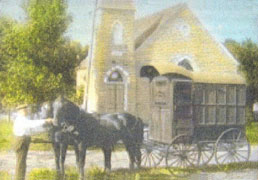 hnson), but there
were so many Johnsons
hnson), but there
were so many Johnsons  at the time he arrived in the United States, when he applied
for citizenship, he chose the name Sandblom. The "Sand" was from
his family home in Sweden (Sandbacken). The "Blom" was for the
name of his parish in Sweden. This changing of names by immigrants from
Sweden was very common. A. G. Sandblom first served as a pastor in Soudan,
Minnesota, but soon he was invited by a wealthy Christian farmer in Albert Lea
to begin a ministry in Northwest Minnesota as a colporteur, (selling and
distributing Bibles and Christian literature). On October 10, 1902, he
left Albert Lea in a wagon and headed for Mankato, Willmar, and
Alexandria. The Baptists in Minnesota purchased the wagon that A G
Sandblom used. The Baptists in Minnesota also purchased a similar wagon
and was named, "the Palmquist Memorial Wagon." This one was used
by the blind evangelist, A J Freeman and his daughter Ester. The wagon was
quite a novelty and created a sensation wherever it went.
at the time he arrived in the United States, when he applied
for citizenship, he chose the name Sandblom. The "Sand" was from
his family home in Sweden (Sandbacken). The "Blom" was for the
name of his parish in Sweden. This changing of names by immigrants from
Sweden was very common. A. G. Sandblom first served as a pastor in Soudan,
Minnesota, but soon he was invited by a wealthy Christian farmer in Albert Lea
to begin a ministry in Northwest Minnesota as a colporteur, (selling and
distributing Bibles and Christian literature). On October 10, 1902, he
left Albert Lea in a wagon and headed for Mankato, Willmar, and
Alexandria. The Baptists in Minnesota purchased the wagon that A G
Sandblom used. The Baptists in Minnesota also purchased a similar wagon
and was named, "the Palmquist Memorial Wagon." This one was used
by the blind evangelist, A J Freeman and his daughter Ester. The wagon was
quite a novelty and created a sensation wherever it went. When the snows of December came, the wagon could go no further. Missionary Sandblom left the wagon and horses and continued on the train. He sold Bibles and preached in many settlements on the Iron Range. When spring came, he headed back to get his horse and wagon and continued his ministry until 1904. By then he was married and had a child, and the family had moved to Salt Lake City and surrounding areas to preach among the Mormons. A few responded to the gospel call and believed. Mormon superstition constituted a veritable stone wall which was next to impossible to break through.
After two years Rev. Sandblom moved to Oregon. He was the missionary for what is now the Columbia Conference during the period 1907-1912. He wrote a brief résumé of his work on the request of Rev. Gideon Sjolander as stated: "I will comply with this request concerning Oregon's Conference activity during the time I was missionary; it is easy enough to do so because I have kept copies of the minutes of the annual meetings reports and entries in my diary. I need not depend on my memory.
"During my time of service I visited places all the way from Medford and Coos Bay in the south to Highland and Venersborg in the north and toward the east to Estacada and Colton.
'The church at Warren was organized June 5, 1907 with seven members, increased to 13 by 1910. the church there
 had also a rather
good Sunday School."
had also a rather
good Sunday School."During his 5 year period as missionary he preached, "898 sermons, 276 brief talks; 1,875 family devotions; 3,931 religious home visitations, visited Sunday School 188 times, given out 140 Bible and Testaments, 638 religious books, 9,146 pages of tracts, sold $220.00 worth of literature from our book store; written 1,531 letters and in the interest of the work written 176 newspaper articles--some reports of meetings. Have gained 47 new subscribers to denominational papers, welcomed 16 by letter of transfer and confession of faith, baptized 3 (some went to Portland to be baptized in the church). Have led 81 business meeting, conducted communion services 61 times. Three churches and four Sunday Schools were organized, and two churches were built--in Fish Hawk and Haley--with very little help from the outside. Have gathered $816.24 for various mission cause. Journeyed 29,070 miles, by various means, these travels cost $726.93 of the Missionary's salary, for in that day, the missionary paid his own travel expense. We were privileged to pray with some anxious soul, now and then, but there was not any actual revival."
A G Sandblom was the Missionary at the time Cherry Grove was becoming a town. He worked with Baptists that had settled there and organized the Cherry Grove Baptist Church in 1912.
Missionary Sandblom wrote a 90-page autobiography in Swedish that was later translated into English by his daughter, Edna West. His autobiography is available in the History Center at Bethel Seminary.